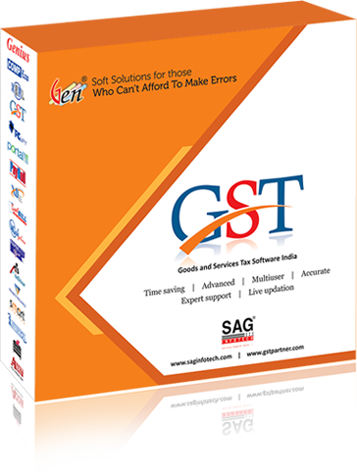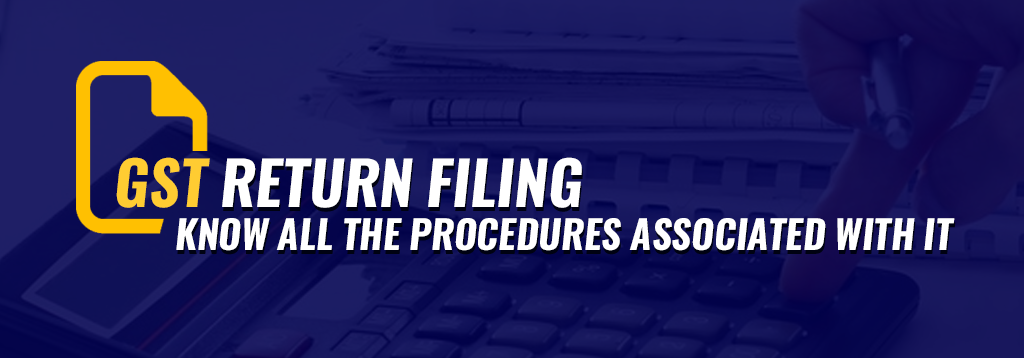GST return filing on or before the due date is necessary for every taxpayer to avoid any penalty. Here is a GST calendar with all GSTR forms and their current GST return due dates. This can help you to file all your returns.
One must be aware that under GST taxation process, a tax paying entity will have to file returns on an average 3 per month and one annual return, which sums up to 37 returns a year.
It must be noted that according to the GST model law, all the GST returns are mandatory and penalty will be imposed if a taxpayer miss to file the returns.
Recommended: Latest 34th GST council meeting updates
Click here to download all GST Return Forms
How to File GST Return Online:
- First login/signup on the Government’s GST Portal: www.gst.gov.in.
- After the successful login, a user will be provided with a 15-digit GST identification number (GSTIN) based on his/her state code and PAN number.
Contents
Steps For GST Return Filing
Step 1:
The taxpayer will have to upload the final GSTR-1 return form either through data entry at the GST Common Portal or by uploading the record containing the said GSTR-1 return form through Apps by the 10th day of the month in which suppliers have been made.
The increase/decrease in the supply sales would be allowed, just on the preface of the details uploaded by the counter-party purchaser in GSTR-2, up to the 17th day of the month.
The supplier would not be allowed to incorporate any missing solicitations all alone after the 10th day of the month. GSTN will provide periodic (may be daily, weekly etc) upload of such information to minimize last-minute load on the system. GSTN will also felicitate offline preparation of GSTR-1.
Step 2:
GST Common Portal (GSTN) will auto-draft the provisional GSTR-2A of a taxpayer on the basis of the supply invoice details reported by the counter-party taxpayer (supplier) on a near real-time basis.
Step 3:
Purchasing taxpayer will have to accept/reject/modify such auto-drafted GSTR-2A. A taxpayer will have the other option to download his/her provisional purchase statement from the Portal or through Apps using Application Programming Interface (APIs) and can update/modify it even without an online connection.
Step 4:
Purchasing taxpayer will also have the capacity to include extra purchase purchase invoice details in his/her GSTR-2, which has not been uploaded by counter-party taxpayer (supplier) as depicted in Step 1 and 2 above, if he/she has legitimate invoice issued by counter-party taxpayer and he/she has truly got such supplies.
Step 5:
The taxpayers will have the option to do restoration of inward supplies with counter-party taxpayers (suppliers) during the next 7 days by following up with their counter-party taxpayers for any missing supply invoices in the GSTR-1 of the counter-party taxpayers and prompt them to accept the same as uploaded by the purchasing taxpayer.
All the invoices will be auto uploaded in the ITC ledger of the taxpayer, however, the taxpayer can indicate the eligibility/partial eligibility for ITC if he/she is not entitled to partial ITC.
Step 6:
Taxpayers will finalize their GSTR-1 and GSTR-2 by using the online facility at Common Portal or using GSTN compliant off-line facility in their accounting applications, determine the liability on their supplies, determine the amount of eligible ITC on their purchases and then generate the net tax liability from the system for each type of tax.
Cash details as per personal ledger/carried forward from previous tax period, ITC carried forward from previous tax period, ITC reversal and associated Interest/Penalty, taxes paid during the current tax period etc. would get auto-uploaded in the GSTR-3 form.
Step 7:
Taxpayers will have to pay the amount as shown in the draft GSTR-3 return generated automatically at the Portal after the finalization of activities mentioned in Step 6 above.
Step 8:
The taxpayer will debit the ITC ledger and cash ledger and mention the debit entry No. in the GSTR-3 return and will have to submit the same.
In the article above, one can find all the details and easy steps of GST Return Filing. Everything has been discussed in all ‘length and breadth’ for the easy understanding. But, if anyone still has any doubt, then he/she can just comment below, we would be more than happy to assist in all possible ways.
Download GST Return Rules in PDF
Revised Due Dates for GSTR-1 Turnover up to Rs 1.5 Crore
| GSTR-1 Due Dates (Up to Rs 1.5 Crore) | |
| Months (Quarterly) | Due Dates |
| April-June, 2019 | |
| July-Sept, 2019 | |
| Oct-Dec, 2019 | 31st Jan 2020* |
Note: For all the newly migrated taxpayers GSTR 1 due date ((Turnover Upto Rs 1.5 Crore) for all the quarters from July 2017 to December 2018 extended till 31st March 2019.
Revised Due Dates for GSTR-1 Turnover more than Rs 1.5 Crore
| GSTR-1 Due Dates (More than Rs 1.5 Crore) | |
| Monthly | Due Dates |
| November 2018 | |
| December, 2018 | |
| January, 2019 | |
| February, 2019 | |
| March, 2019 | |
| April, 2019 | |
| May, 2019 | |
| June, 2019 | |
| July, 2019 | |
| August, 2019 | |
| September, 2019 | |
| October, 2019 | |
| November, 2019 | |
| December, 2019 | |
| January, 2020 | 11th February 2020* |
Note: GSTR 1 due date (Turnover more than Rs 1.5 Crore) for all the newly migrated taxpayers is extended till 31st March 2019 for the months from July 2017 to December 2018.
Revised GSTR 3B Due Dates
| GSTR 3B Due Date | |
| Months | Due Dates |
| Oct 2018 | |
| Nov 2018 | |
| Dec 2018 | |
| Jan 2019 | |
| Feb 2019 | |
| March 2019 | |
| April 2019 | |
| May 2019 | |
| June 2019 | |
| July 2019 | |
| August 2019 | |
| September 2019 | |
| October 2019 | |
| November 2019 | |
| December 2019 | |
| January 2020 | 20th February 2020* |
Note: GSTR-3B due date only for newly migrated taxpayers for months July 2017 to Feb 2019 has been extended till 31st March 2019.
GSTR 4 Return Filing Due Dates
| GSTR 4 Due Date | |
| Period (Quarterly) | Due Dates |
| April to June 2019 | 3 |
| July to September 2019 | |
| October to December 2019 | |
| January to March 2020 | 18th April 2020* |
GSTR-5 (Non-Resident Foreign Taxpayers) Due Dates
| GSTR 5 Due Date | |
| Period (Monthly) | Due Dates |
| January 2019 | |
| February 2019 | |
| March 2019 | |
| April 2019 | |
| May 2019 | |
| June 2019 | |
| July 2019 | |
| August 2019 | |
| September 2019 | |
| October 2019 | |
| November 2019 | |
| December 2019 | |
| January 2020 | 20th February 2020* |
GSTR-5A (Non-Resident OIDAR Service Provider) Due Dates
| GSTR 5A Due Date | |
| Period (Quarterly) | Due Dates |
| January 2019 | |
| February 2019 | |
| March 2019 | |
| April 2019 | |
| May 2019 | |
| June 2019 | |
| July 2019 | |
| August 2019 | |
| September 2019 | |
| October 2019 | |
| November 2019 | |
| December 2019 | |
| January 2020 | 20th February 2020* |
GSTR-6 (for Input Service Distributor) Filing Due Dates
| GSTR-6 Due Dates | |
| Month | Due Date |
| December 2018 | |
| January 2019 | |
| February 2019 | |
| March 2019 | |
| April 2019 | |
| May 2019 | |
| June 2019 | |
| July 2019 | |
| August 2019 | |
| September 2019 | |
| October 2019 | |
| November 2019 | |
| December 2019 | |
| January 2020 | 13th February 2020* |
GSTR 7 Due Date for TDS Deductor
| GSTR-7 Due Date | |
| Period | Due Dates |
| October 2018 to July 2019 | |
| August 2019 | |
| September 2019 | |
| October 2019 | |
| November 2019 | |
| December 2019 | |
| January 2020 | 10th February 2020* |
GSTR 8 Due Date for TCS Collector
| GSTR-8 Due Date | |
| Period | Due Dates |
| January 2019 | |
| February 2019 | |
| March 2019 | |
| April 2019 | |
| May 2019 | |
| June 2019 | |
| July 2019 | |
| August 2019 | |
| September 2019 | |
| October 2019 | |
| November 2019 | |
| December 2019 | |
| January 2020 | 10th February 2020* |
Due Dates for GSTR 9, GSTR 9A and GSTR 9C Annual Return
| Annual Return Due Dates | |
| GST Return | Due Dates |
| GSTR 9 (Annual Return) (FY 2017-18) | 31st January 2020* (Read Notification) |
| GSTR 9A (Composition Annual Return) (FY 2017-18) | 31st January 2020* |
| GSTR 9C (GST Audit Form) (FY 2017-18) | 31st January 2020* (Read Notification) |
| GSTR 9 (Annual Return) (FY 2018-19) | 31st March 2020* |
| GSTR 9A (Composition Annual Return) (FY 2018-19) | 31st March 2020* (Check Notification) |
| GSTR 9C (GST Audit Form) (FY 2018-19) | 31st March 2020* |
Due Dates for GSTR 10
| GSTR-10 Due Date | |
| GST Return | Due Dates |
| GSTR 10 | Within 3 months from the date of registration cancellation or date of the cancellation order whichever comes later. |
Read Also: TDS/TCS Return Due Date AY 2019-20 (FY 2018-19)
Due Dates for TRAN 1 and TRAN 2
| TRAN 1 and TRAN 2 | |
| Return | Due Dates |
| TRAN 1 | 31st December 2017 |
| TRAN 2 (July to December 2017) | 30th June 2018 |
Note: Due date of TRAN-1 and TRAN-2 is extended for taxpayers who faced problems due to technical glitches while return filing, to 31st March 2019 and 30th April 2019 respectively.
Types of GST Returns and their Regular Due Dates
There will be various types of GST returns under the GST taxation procedure, and of all those, the most commonly used will be the GSTR 1, 2,3, 4 and 9. GSTR 1, GSTR 2 and GSTR 3 will be submitted by the traders on the monthly basis, while the GSTR 4 on a quarterly and GSTR 9 on the yearly basis.
In this below table you can find information about GST Return form, what to file, who will file and the due dates of GST returns:
| GST Return | Details | By Whom? | GST Return Due Dates |
| GSTR-1 | Details of outward supplies of Taxable Goods and Services | Registered Taxable Supplier | 11th of the next month |
| GSTR-2 | Details of internal supplies of taxable goods and services affected asserting input tax credit | Registered Taxable Recipient | 15th of the next month |
| GSTR-3 | Monthly return after finalizing elements of outward supplies and internal supplies along with the payment of the taxable amount. | Registered Taxable Person | 20th of the next month |
| GSTR-4 | Quarterly return for compounding taxable person. | Composition Supplier | 18th of the month succeeding quarter |
| GSTR-5 | Return for NRI Taxable Person | Non-Resident Taxable Person | 20th of the next month |
| GSTR-6 | Return for Input Service Distributor | Input Service Distributor | 13th of the next month |
| GSTR-7 | Return for authorities deducting charge at the source. | Tax Deductor | 10th of the next month |
| GSTR-8 | Details of supplies through e-commerce operator and the amount of tax collected | E-commerce Operator/Tax Collector | 10th of the next month |
| GSTR-9 | (Annual Return) FY 2017-18 | Registered Taxable Person | 31st December of Next Financial Year |
| GSTR-9A | Composition Annual Return | Taxpaying compounding of Annual return | 31st December of Next Financial Year |
| GSTR-9C | GST Audit Form | Taxpayers having the turnover above 2 crores in a financial year | 31st December of Next Financial Year |
| GSTR-10 | Final Return | Taxable individual whose registration has been surrendered or cancelled | Within three months of the date of cancellation or date of cancellation request, whichever is later. |
| GSTR-11 | Details of internal supplies to be furnished by a person having UIN | Person having UIN and asserting refund | 28th of the month after which statement is filed |







My client have vat refund of aprox 40000/- when to file trans 1 form
Other clients had paid extra vat. Can he claim in trans 1 form for refund
Pls tell me last date of filling ITC04 Return for the Quarter of October to December 2017.
The due date for GST ITC-04 of October-December 2017 quarter is 25th January 2018.
if we dont file ITC 04 upto 25 jan for oct to dec 2017, what is the penalty?
Also tell the penalties for non filing of July to sep 2017 ITC 04.
Whether a nil return has to filed if a manufacturer has not carried out any job work?
Whether a trader needs to file ITC04 Form?
50 Rs. per day is applicable for late filing GST returns and in case of Nil return 20 Rs. per day.
Nil return should be filed for No business transactions or no work in the particular month.